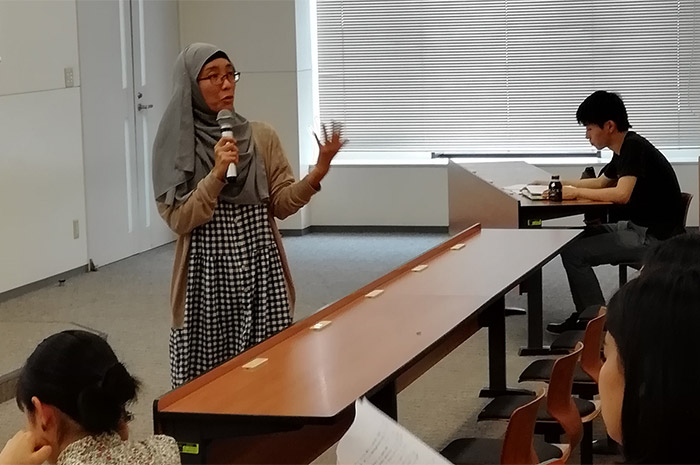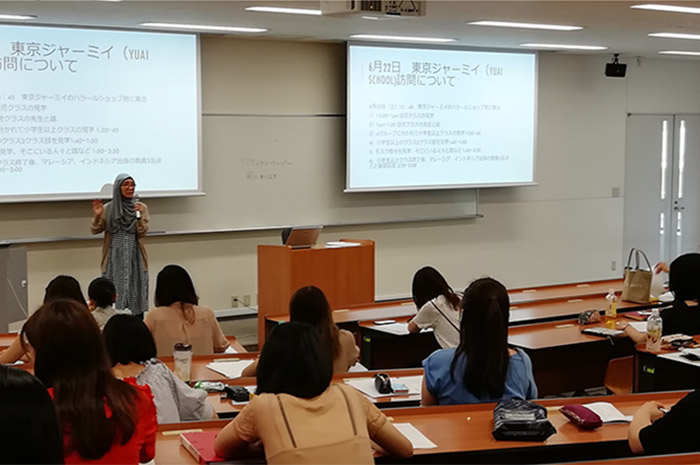Class Introduction:Islam and Society in Southeast Asia
What kind of subjects do FGS students usually take, and what do they learn?
This time, we introduce the subject “Islam and Society in Southeast Asia” by Professor Yuko Kushimoto.

Comment from Professor:
In this course, we discuss various issues related to Islam and society in Southeast Asia from the perspective of cultural anthropology. Many people think of Islam as a religion of the Middle East, but Muslims in Southeast Asia make up about 15% of the global Muslim population (the Middle East and North Africa together account for about 20%), and Indonesia has the largest Muslim population of any country in the world.
Islam was founded in the 7th century, but it is believed that Islam began to spread in earnest in Southeast Asia after the 14th-15th centuries, so the image of information coming “later” to Southeast Asia is correct. However, in the current world connected by the internet, the idea that the Middle East is more advanced in Islamic scholarship and Southeast Asia is lagging is not necessarily accurate. There are many new ways of
practicing and thinking about Islam originating from Southeast Asia. In this course, we aim to think about the relationship between the dynamics of Southeast Asian Islam and society as closely as possible to the level of the daily lives and beliefs of individual Muslims from a cultural anthropological perspective.
Therefore, almost every week in class, students read literature in advance, and based on that, have discussions in small groups. Additionally, we virtually connect with Muslim university students in Malaysia for live Q&A sessions. This semester, as the first half coincided with the fasting month (Ramadan), we divided students into several groups to participate in Iftar (a meal to break the fast) and a lecture at Tokyo Camii Mosque which created opportunities for direct interactions with Muslims. Although it may be challenging for students because it is not just “listening”, I hope they can realize the limitations of the topics they hear in the news about Islam and gain a new perspective on how things look from a Muslim point of view.

Class Interview
Through the compulsory subject of Christian Human Studies, I noticed the strength of faith and the significance of religion, and I wanted to think more deeply about it. At that time, I made a Muslim friend and became curious about what she believes in. Additionally, the strong association of Islam with the Middle East made me interested, as I found it surprising that there are Muslims living geographically close to Japan in
Southeast Asia.
The knowledge acquired through preparatory study is further explored in class, shared with other students, and feedback is provided, leading to a structured learning process that deepens your thinking. Moreover, through conversations with local students and visits to mosques, I realized the prejudice I had towards religion and my thoughts began to change. I was moved by that realization. I believe that thoroughly studying one culture can also be beneficial for academic and research pursuits in other fields.
(Yasue Kurauchi, Fourth-year, Faculty of Global Studies)
Up until now, there have been a few FGS classes where Islam was the topic, but this is the first time that a class focusing on the “Southeast Asia” region and Islam has been offered which matched with my major in Asian Studies, so I decided to take it.
Generally, preparatory materials are provided each time, and by reading the literature, summarizing it myself, and creating timelines, my understanding of the class deepened. Also, since discussion time is set in class, I can gain new perspectives that I hadn't noticed on my own.
(Natsuki Yamaki, Third-year, Faculty of Global Studies)
What motivated me to enroll in this class was our previous interest in the Southeast Asian region. I plan to delve deeper into Southeast Asian Area Studies as my major field in the future. Additionally, I am interested in religion in Southeast Asia, and am particularly interested in Indonesia where Islam is widely practiced. I thought by taking this class I could learn things about Indonesia that I didn't know before. Furthermore, since the instructor for this class, Professor Hisamoto, was in Malaysia until last year, I thought I would be able to get very fresh information.
The attraction of this class is that we have the opportunity to connect with Malaysian students via teleconference to ask about the lives of peers who are Muslims and to go to mosques for lectures as part of our fieldwork, which offers not just theoretical learning but also having the chance to talk to people who practice Islam. Additionally, even in regular classes, the appeal lies in being able to widely learn from the basics of Islam (what kind of religion Islam is, what it believes in) to how it spread in Southeast Asia and what historical events occurred until the present day.
(Second-year, Faculty of Global Studies)

